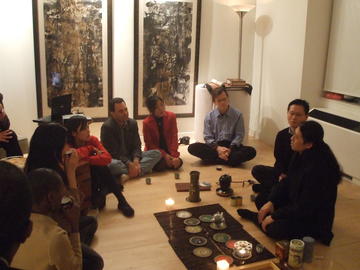 Tea, Tao and Art Group
Tea, Tao and Art Group
I have a friend who is making and drinking Kombucha and he is willing to share the health secret with you.
I also remembered when I was young, all Chinese families were making Kombucha. Well, that fashioned passed quickly but I now realize that if Tea is a health drink, Kombucha must be good ! If you are willing to learn how to make it at home, come to learn with my friend Mike Li at my studio.
The charge includes class fee and a piece of Kombucha to take home to grow.
Below are information:
Kombucha is a living health drink made by fermenting tea and sugar with the kombucha culture. The result can taste like something between sparkling apple cider and champagne, depending on what kind of tea you use. It’s not what you’d imagine fermented tea to taste like.
The origins of Kombucha have become lost in the mists of time. It is thought to have originated in the Far East, probably China, and has been consumed there for at least two thousand years. The first recorded use of kombucha comes from China in 221 BC during the Tsin Dynasty. It was known as “The Tea of Immortality”.
It has been used in Eastern Europe, Russia and Japan for several centuries. It’s from Japan in 415 AD that the name kombucha is said to have come. A Korean physician called Kombu or Kambu treated the Emperor Inyko with the tea and it took his name, “Kombu” and “cha” meaning tea. Russia has a long tradition of using a healing drink called “Tea Kvass” made from a “Japanese Mushroom”.
From Russia it spread to Prussia, Poland, Germany and Denmark but it seems to have died out during World War Two. After the war Dr Rudolph Skelnar created renewed interest in kombucha in Germany when he used it in his practice to treat cancer patients, metabolic disorders, high blood pressure and diabetes.
The Kombucha Culture
The Kombucha culture looks like a beige or white rubbery pancake. It’s often called a ‘scoby’ which stands for ‘ symbiotic culture of bacteria and yeasts. The culture is placed in sweetened black or green tea and turns a bowl full of sweet tea into a bowl full of vitamins, minerals, enzymes and health-giving organic acids.
As the Kombucha culture digests the sugar it produces a range of organic acids like glucuronic acid, gluconic acid, lactic acid, acetic acid, butyric acid, malic acid and usnic acid; vitamins, particularly B vitamins and vitamin C; as well as amino acids, enzymes. And of course there are all the benefits of the probiotic microorganisms themselves. The Kombucha culture is a biochemical powerhouse in your kitchen.
You might wonder if fermenting tea with yeasts would produce an alcoholic beverage. It’s a good question. The yeasts do produce alcohol but the bacteria in the culture turn the alcohol to organic acids. Only minute quantities of alcohol, typically 1% by volume remains in the kombucha brew.
With every brew you make the kombucha forms a new layer or scoby on the surface of the liquid. These can be left to thicken the scoby or can be divided, giving you spare cultures that you can store in some sweet tea in the fridge in case something should happen to your active culture. Or you might want to pass on spare Kombucha cultures to friends or use a new scoby to start another batch of kombucha.
Kombucha and Health
Many health claims are made for kombucha but there is less research on the benefits of kombucha than there is on fermented milk products. It has certainly been shown to have similar antibiotic, antiviral and anti fungal properties in lab tests. In rats it?s been shown to protect against stress and improve liver function. There is a lot of experiential evidence from people who have been using kombucha over many years. Many of the benefits reported include improvements in energy levels, metabolic disorders, allergies, cancer, digestive problems, candidiasis, hypertension, HIV, chronic fatigue and arthritis. It ?s also used externally for skin problems and as a hair wash among other things.
New York, NY 10006 – USA
Sunday, June 20 at 5:00 PM
Attending: 1
Fee: Price: USD 10.00 per person
Details: http://www.meetup.com/ChaTao/calendar/13422608/

